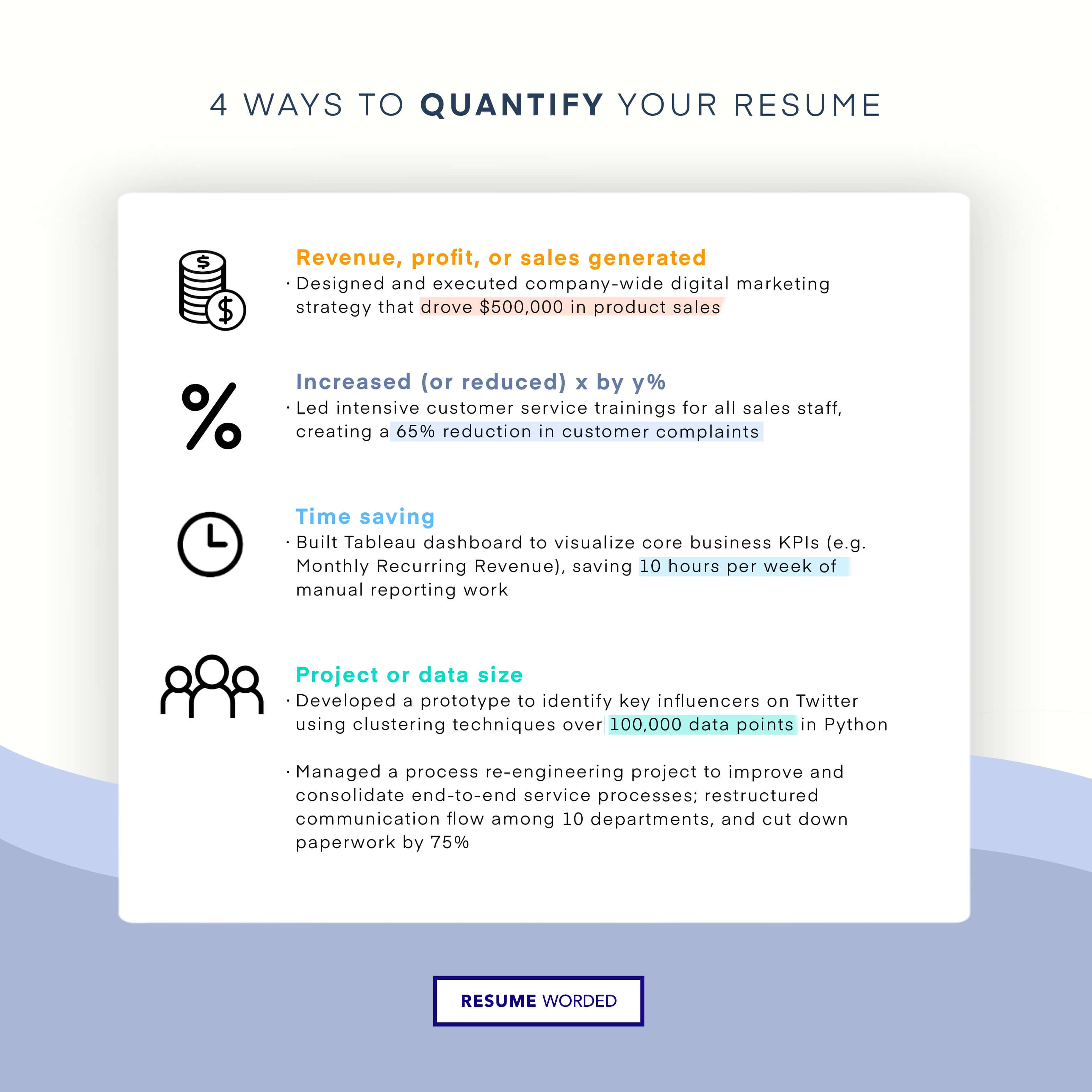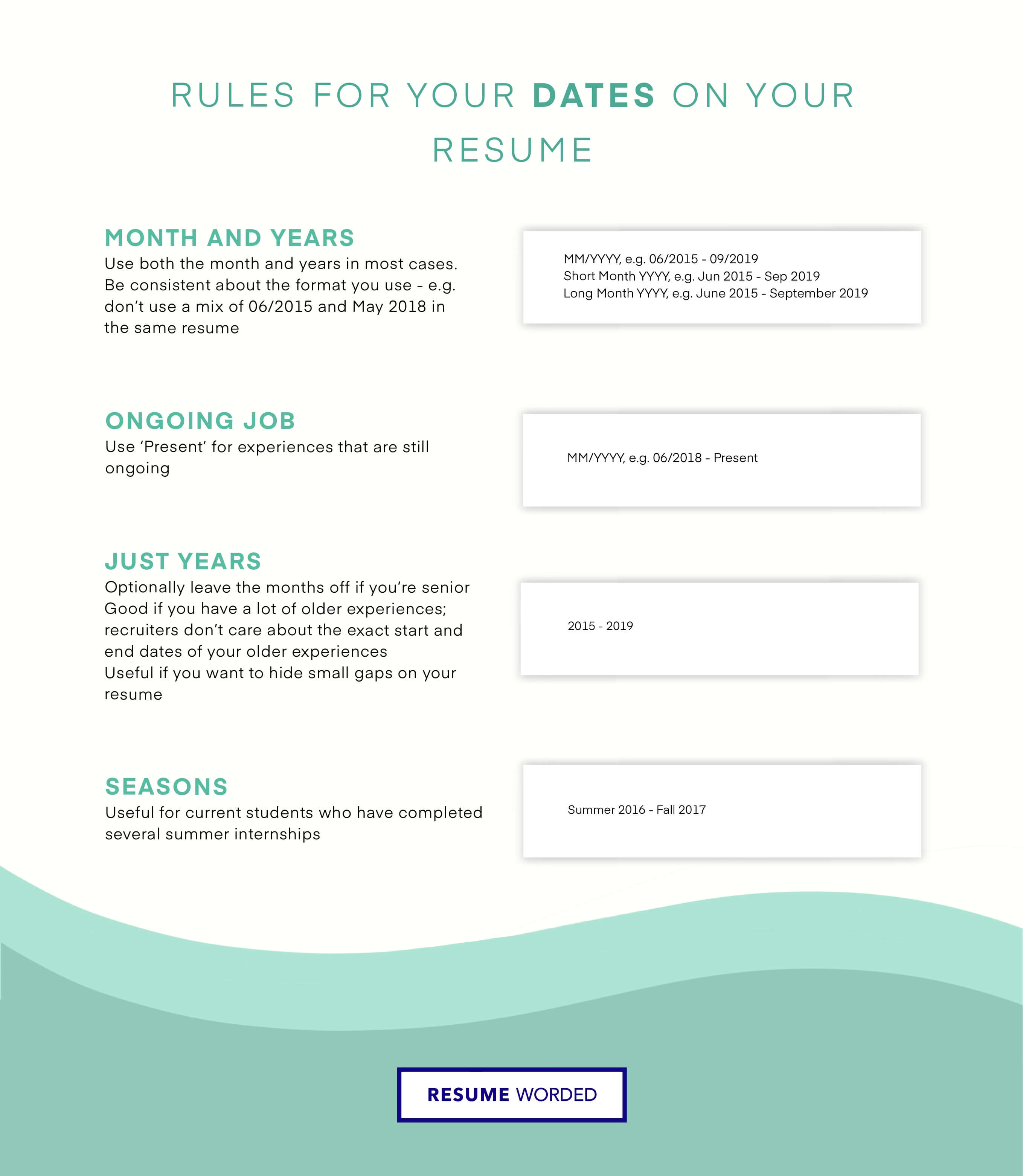Job hunting can be tricky, especially if you're looking for your first full-time job. The good news is, a lot of resume dilemmas have surprisingly simple answers — like how to list a degree on your resume when you haven't graduated yet.
It's fine — even normal — to list an expected graduation date on your resume before you complete your degree. Just list your degree information in your education section as you would for a completed degree, followed by your expected graduation date.
In this article, we'll discuss how to list an expected graduation on your resume, alternatives to listing an expected graduation date, and what to do if you're uncertain of your graduation date.
How to list an expected graduation date on your resume
You can list expected graduation on a resume in the exact same way as you would list a completed degree — as long as you make it clear that you haven’t graduated yet. Here’s how:
- Create an ‘Education’ section for your resume. If you’re about to graduate and don’t have a lot of work experience yet, keep this section at the top of your resume underneath your contact details.
- List the name of the school you attended, the location, and the degree you studied.
- (Optional) Include your major and any relevant minor(s).
- Beside the degree, list the month and year you expect to graduate (if known).
- As a recent graduate, you can also add extra information like your GPA, relevant coursework, study abroad, and honors or awards. These are all optional, and you can take them out after you have a little more work experience.
- For free, professional feedback on your resume, run it through an ATS resume scanner that can pick up anything you may have missed.
Examples of how to list an expected graduation date
Here are some examples of how to put a pending degree on your resume that you can copy and paste:
Resume Worded University, Boston, MA
Bachelor of Engineering (Expected May 2024)
Major in Computer Science
Ohio State University, Columbus, OH
Bachelor of Arts in Digital Marketing
Expected Graduation: May 2024
And here’s an example of what the education section of your resume should look like with an expected graduation date:
Expected graduation date format
There’s more than one correct way to put expected graduation on your resume. You can list an expected graduation date in any of the following ways:
- May 2021 - May 2024
- May 2024 (Expected)
- Expected May 2024
- Anticipated 05/2024
- Expected graduation 2024
It’s acceptable to:
- Write out the full month and year you expect to graduate
- Put ‘expected’ or ‘anticipated’ next to your graduation date
- Write your expected graduation date in numerical format
- Include the start and end dates of your degree
- Use the abbreviation for expected graduation date, EGD, to save space
- Use the same date format as on the rest of your resume — for example, if you list your work experience dates as 06/2022, your expected graduation should look like ‘Expected 05/2024’
The only thing that’s not acceptable is to list the date as if you’ve already graduated — even if all that’s left is for you to walk, being upfront and honest on your resume is always the best move.
Should you put an expected graduation date on your resume?
In general: Yes, you should put expected graduation on your resume. Listing your planned undergraduate graduation date:
- Makes it clear that you haven’t graduated yet and aren’t trying to hide that fact.
- Indicated that you’re still in school and may not have full-time availability until graduation.
- Contextualizes the rest of your resume and professional experience
Alternatives to listing an expected graduation date
For students far from their expected graduation date, showcasing skills and coursework can be more beneficial than listing a distant graduation date. This is particularly effective when your graduation is several years away, or the exact date is uncertain.
Instead of a graduation date, detail the coursework you have completed or are currently undertaking that's relevant to the job you are applying for. This could include specific subjects, hands-on experience, internships, projects, and research that aligns with the job requirements. Highlight transferable skills such as critical thinking, problem-solving, and technical abilities, and list technical hard skills in your skills section.
Issues with putting an inaccurate graduation date on your resume
Misrepresenting your graduation date, even unintentionally, can have serious professional consequences and lead to a loss of trust between you and your potential employer. Many employers conduct background checks that include verification of educational credentials, and any discrepancy can result in the withdrawal of a job offer or raise questions about your professional integrity.
To avoid these risks, always ensure that the information on your resume, especially regarding your education, is accurate and up-to-date.
What to do if you don't know your expected graduation date (and other tricky situations)
If you're unsure about your exact graduation date, it's important to provide a tentative date while being transparent about the uncertainty. Here's how:
- If you can reasonably guess your graduation date, list your best guess, especially if it's far in the future.
- If you're uncertain about the month, list only the year, for example, 'Expected graduation 2025'. If even the year is uncertain, use phrases like "Expected Graduation: TBD" to indicate that the date is to be determined.
- Consider using a projected range instead of a specific date. For example, "Graduation: Spring 2024 to Fall 2024".This is particularly useful for part-time or those needing to extend their studies.
- Make sure to keep your resume updated frequently, especially as you get closer to graduation and have a clearer idea of the date.
Here is some further advice for other tricky graduation situations:
If you’re currently on hiatus from school:
You can still list an expected graduation date (and it’s okay if this changes).
If you have an unfinished degree that you’re not planning to return:
List the dates you attended and your number of completed credit hours, e.g.
Resume Worded University (2020 - 2021)
New York, NY
Bachelor of Science in Engineering — Completed 20 credit hours
If you’re completing a masters degree:
List your expected graduation date along with the rest of your educational details at the top of your resume.
If you’re doing an MBA:
Still list your expected graduation date as normal. If you’re still working while pursuing an MBA, keep your education section below your work experience. If you’re using your MBA to pivot careers and your current line of work isn’t super relevant, then it makes more sense to list your education first.
If you're enrolled in an online or part-time degree
Treat online degrees like traditional ones on your resume. Specify the institution, degree, and, if known, your expected graduation date. Clearly specify if your degree is part-time, particularly if this extends the program's duration. For example: "Master of Business Administration (Part-Time), ABC Business School, Expected Completion: 2025."
If you haven’t yet started your degree program:
There’s no need to list your expected graduation — or your degree — until you start your program. It would look strangely out of touch to list an expected graduation for a degree you haven’t yet begun. Instead, you can mention your upcoming enrollment in a cover letter, especially if that’s the reason you’re looking for a temporary or part-time job.
If you’re changing careers:
You can put your education section back at the top of your resume if you’ve gone back to school, even for a short course. On the other hand, it’s okay to leave a degree off your resume if it’s no longer relevant.
If you’re still in high school:
Only list an expected graduation date until you’re in college or your first job. List your school, location, and expected month and year of graduation, e.g.
Beverly Hills High School, Beverly Hills, CA
Expected graduation May 2024
How to show commitment to completing your degree
If your graduation date is uncertain or far ahead, it's important to show commitment to completing your degree.
- Highlight any ongoing learning or development activities that are part of your degree program. This could include attending workshops, participating in relevant online courses, or engaging in extracurricular activities.
- If your graduation date is not set, indicate your progress towards the degree. For instance, "60% of degree requirements completed," or "Expected to complete major coursework by 2024".
- Showcase significant academic projects or research you're involved in to demonstrate active engagement in your field of study.
- List any academic achievements or honors you have received during your course to show your dedication and commitment to your study.
- Briefly mention any future academic goals in your cover letter. This shows foresight and planning, reinforcing your commitment to completing your education.
Handling gaps or changes in your graduation timeline
The path to graduation isn't always a straight line. You might face circumstances that lead to a break in your studies or a change in your academic path. Here's how to address these situations on your resume:
- Explain your situation: In most cases, especially if the gaps or changes significantly impact your academic timeline, it's helpful to briefly mention the reason for your change in your cover letter. This allows you to explain in a positive light, focusing on how these experiences have prepared you for the workforce.
- Be honest about the gap: If you're taking a hiatus from your education, it's important to address this gap honestly. List the time frame you attended the school, for example, "University of XYZ (2018 - 2020; returning 2022)," to indicate the break in your studies.
- Highlight the change: If you've changed your major or shifted to a different academic program, it's best to list the most current program and expected graduation date. You can also include a brief note on the change if it's relevant to your career goals, such as "Previously pursued Major A, now focusing on Major B to align with career interests in [field]."
- Addressing extended study periods: If your graduation is extended beyond the traditional timeline, such as an extended Masters or research program, you can simply list your expected graduation date without drawing attention to the length of time in school.. Your focus should be on the skills and knowledge you’ve gained during your studies.










